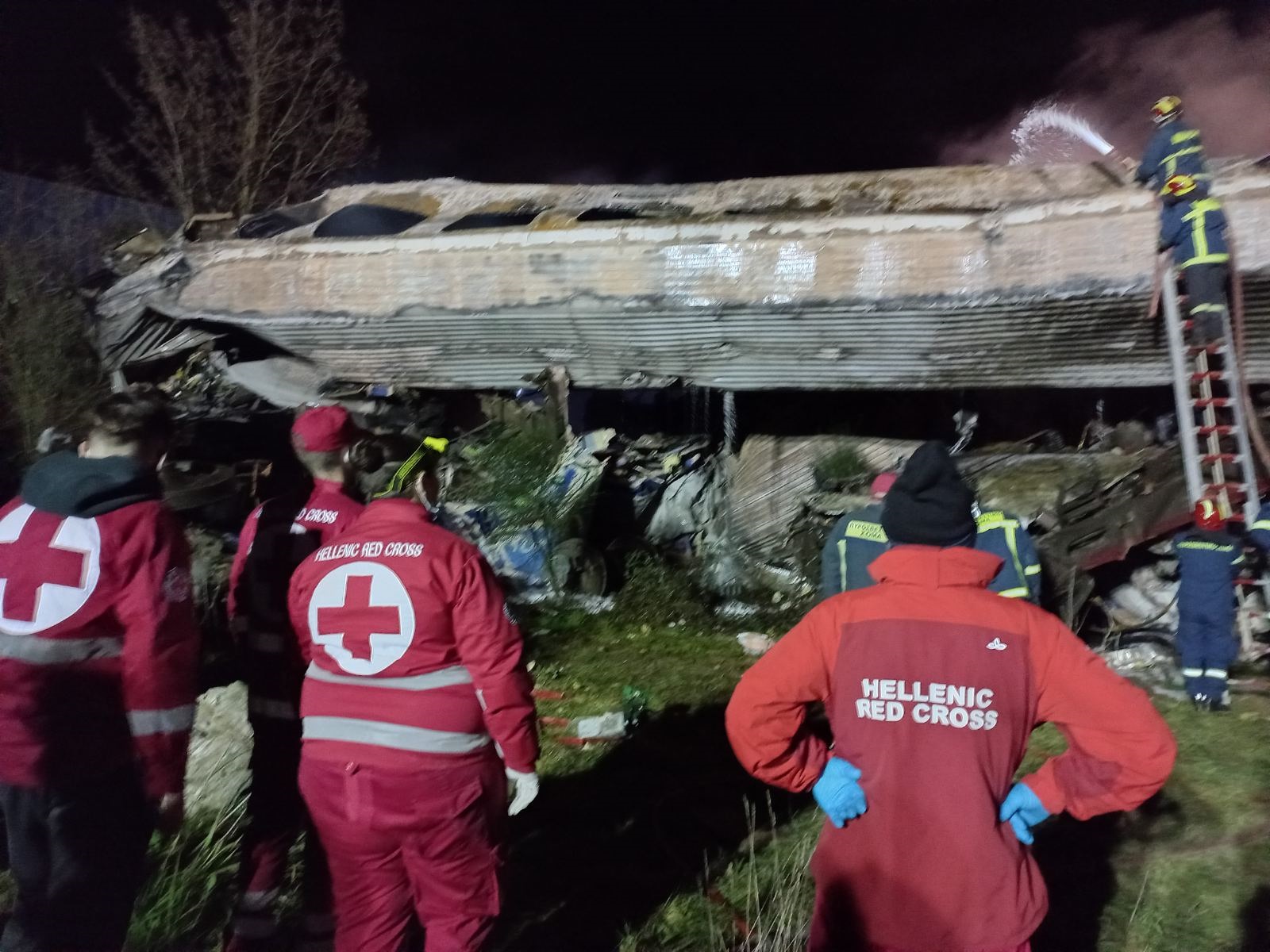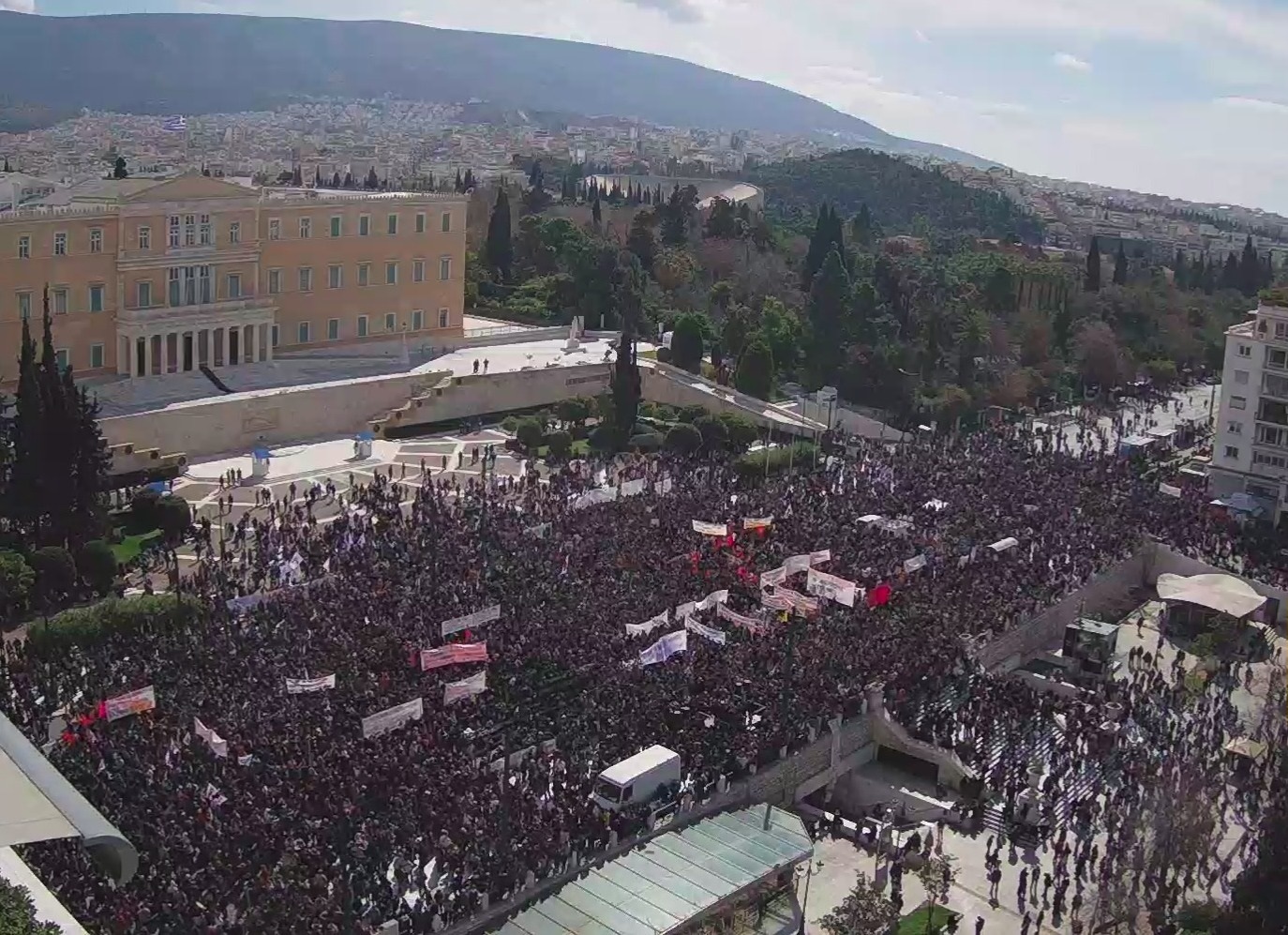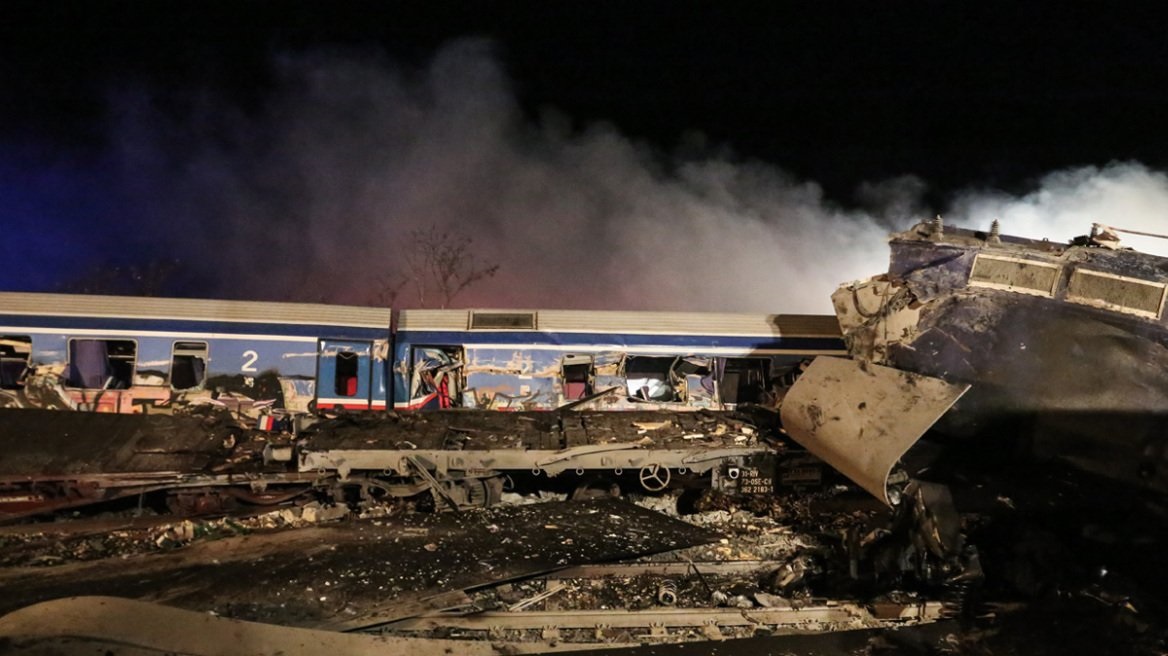Since the evening of 28 February, Greek society has been rocked by the deadliest railway accident in the history of the country, and one of the worst in European and world history. This terrible event, resulting from the negligence of the government and private rail operators, has provoked a huge outpouring of anger and protest, as well as strike action by railway workers and other sectors. A 24-hour general public sector strike has been announced for tomorrow (8 March). The tragedy has further ratcheted up the class struggle in Greece, which was already roaring back to life.
The bloody collision between a commercial and a passenger train in Tempi (near the city of Larisa in central Greece) led to 57 dead and 72 injured, as of the time of writing these lines. This bloodshed could have been avoided easily with most elementary precautions. This was not merely an accident: it was a crime.
Criminal indifference
Despite attempts by the government and media to cover up the truth, the masses understοοd the criminal nature of the tragedy from the first testimonies of the railway workers.The fatal collision of the two trains was due to the simultaneous and egregious failure of the light signalling; the remote control; and the special electronic traffic control system (ETCS) which protects against human error. If all these safety systems had been working, then the collision would have been avoided.
 Despite attempts by the government and media to cover up the truth, the masses understοοd the criminal nature of the tragedy from the first testimonies of the railway workers / Image: Hellenic Red Cross, Twitter
Despite attempts by the government and media to cover up the truth, the masses understοοd the criminal nature of the tragedy from the first testimonies of the railway workers / Image: Hellenic Red Cross, Twitter
But instead, it was revealed in front of the astonished eyes of millions of people that the coordination of railway routes is done exclusively by a few, often elderly and insufficiently trained station masters.
The government; its relevant ministry; the privileged bureaucrats in the management of OSE (Greek Railways Organisation); and Hellenic Train - the profiteering company that has monopolised the country's railway network since 2017 - had all received ample and dire warnings from workers and their unions of an impending, major crash.
Just four months ago, at the beginning of November, after repeated derailments and staff injuries, the Panhellenic Union of Traction Personnel (PEPE) sent legal document to OSE and the Ministry of Infrastructure, with notification to the Railway Regulatory Authority (RAS), denouncing all the scandalously unresolved technical problems that eventually led to the Tempi collision. The union emphasised that understaffing and underfunding had reached extremely dangerous levels and demanded that immediate measures be taken.
The same issues were raised just a few days before the crash occurred, on 7 February 2023, in an announcement by the Democratic Unionists Trade Union Movement of Railways (DESK), the trade union sector of the KKE for railway workers. It even says "we will not wait for the accident that is coming, to see them shed crocodile tears." The indifference with which all these warnings of the workers were met was the final act in carrying out the crime.
The deep roots of crime
The roots of 28 February are very deep. The dire state and delayed refurbishment of the Greek railways is a longstanding symptom of the underdevelopment of Greek capitalism compared to the most advanced Western capitalist states.
The Greek state acquired a central national railway organisation only in 1920, under the name "Railways of the Hellenic State" (S.E.K.). This organisation, in fact, only in the mid-1960s gathered under its control all the railway lines of the country, with the exception of those of the Athens-Piraeus Electric Railways and the private lines of mines and factories. The SEK later evolved into the OSE (Organisation of Railways of Greece) in 1971, combining in its “DNA” the underdevelopment of Greek capitalism and the extreme corruption and military administrative mentality of the ruling junta.
In the mid-1990s, the OSE, at the general urging of the EU for ‘liberation’ (privatisation) of the railways, began the process of privatisation by dividing the rail network up into smaller companies. This led to the establishment of ERGOSE (research) in 1996; GAIOSE in 2001 (estate and real estate management) and TRAINOSE (network operation) in 2005. From 2008, underfunding led to the independence of TRAINOSE from OSE, which officially put it on track to being sold off.
It is worth noting here this model of breaking up the state organisations of the railways did not apply to all "partners" within the EU. Powerful states such as Germany and France did not proceed in this direction – the policy was applied only to poorer countries in the south that already faced austerity conditions in the previous decade.
In April 2013, in the midst of the great government debt crisis, the Samaras-led coalition government (ND-PASOK-DIMAR) transferred all the shares of TRAINOSE to the special fund for the sale of public property, controlled by the troika (European Commission, European Central Bank and the International Monetary Fund), TAIPED. In 2017, the SYRIZA-ANEL memorandum coalition, at the demand of the troika, sold TRAINOSE to the Italian state-owned railway company Ferrovie dello Stato Italiane Group (FSI), and turned it into its joint-stock subsidiary, which from July 2022 is now called Hellenic Train. Of course, the debt of the OSE, amounting to 14.3 billion euros, has always remained with the state and is carried by working taxpayers.
The humiliating price for the privatisation amounted to only 45 million euros, at a time when the Greek state committed to annually subsidising the company with 50 million euros for supposedly "barren" routes, which even included the main train line running from Athens to Thessaloniki. The details of the colonial style contract that accompanied the privatisation are still being kept secret.
Thus, Greece is the only European country in which the citizens do not know which railway routes a private company (subsidised with state money) has committed to running. Of course, the corresponding contract for the subsidising routes that Trenitalia has signed with the Italian State, owned by the company that bought TRAINOSE, has been made public.
Recently, even the Deputy Minister of Transport, in charge of infrastructure, G. Karagiannis, characterised this convention as having a "colonial character", without doing anything to make it public. The Greek state is also the only one in the EU to completely displace the state provider, i.e. OSE, from the execution of a railway project.
Degeneration
The privatisation of TRAINOSE not only did not develop the Greek railways, but dramatically exacerbated the state of disorganisation and systematic underfunding of OSE, and the problems of the ageing network and understaffing.
According to relevant research, which involved 16 journalists from 13 countries, and was published in the Editors' Journal just 12 days before the crash, in the period following privatisation a number of routes were thinned, abolished or replaced by buses. The "Thessaloniki-Alexandroupoli" route, which used to take six hours, now takes eight hours, some of which cannot be done by train! From Alexandroupoli to Ormenio, only one-eighth of the routes from 2016 are still running. Towards the west, the connection between Thessaloniki and nearby cities such as Edessa and Florina has turned into a ‘ghost’ service, with trains running without station masters! In addition, the Peloponnese network has been closed, with the exception of a small section of the line from Pyrgos-Olympia-Katakolon.
The new era of privatisation has brought such a catastrophe, even by capitalist standards, that in 2019 the Greek government officially requested a five-year exemption from the application of the European Regulation 1371/2007 for the protection of passenger rights.
 This disaster underlines the magnitude of the indifference, mismanagement and corruption of the ND government / Image: World Economic Forum, Flickr
This disaster underlines the magnitude of the indifference, mismanagement and corruption of the ND government / Image: World Economic Forum, Flickr
At the same time, OSE has turned into a shadow of its former self. According to the Panhellenic Federation of Railways, today only 880 employees serve in OSE, compared to the approximately 2,100 that are officially needed! So it is to be expected that, in order to be able to ensure the rudimentary operation of the railway, the workers are forced to work overtime every day. The old unified OSE at the beginning of 2000 had 12,500 employees, while now the sum of OSE and TRAINOSE personnel is only about 2,000 people. In fact, the rest of the EU states have more than twice as many personnel per kilometre of network than Greece.
The safety of the routes, as was tragically proven on 28 February, after the privatisation and sharp aggravation of the withering of the OSE, turned into an unnecessary luxury in the eyes of its owners. Today, 55 percent of the network do not have signalling and remote control systems, and only a small part of the Tithorea-Lianokladi-Domokos axis has signalling. In fact, as former railway workers reported to the Naftemporiki newspaper on 3 March, exactly in the section of track where the crime took place, until 2013 the signalling was working. But from 2014, the problems started due to lack of maintenance because the company didn't want to replace the material that was repeatedly stolen.
And all this is happening despite the fact that, according to statements on 3 March by Albert Zanz, press representative of the European Commission for the Environment, since 2016 the Greek state has received 700,000,000 euros from the Connecting Europe Facility programme. This was for projects to upgrade and construct lines, with 110 million allocated for the Athens-Thessaloniki line, on which the electronic control system should have been operational from 2020.
If true, this underlines the magnitude of the indifference, mismanagement and corruption of the ND government, but also the previous SYRIZA-ANEL government. It also highlights the hypocrisy of the EU, which on the one hand is supposed to give money to support the railway as an ecological means of transport, while on the other, through the troika, it calls on the Greek governments to make the biggest possible cuts in staff and operating costs, condemning the railways to withering.
With privatisation also came the extreme aggravation of the understaffing problem. It is indicative that the OSE now has only 30 technicians for the maintenance of signalling from Patras to the Greek-Bulgarian border, while in the past it had more than 300 technicians. And as far as the station masters are concerned, just one day before the crime, the OSE announced the recruitment of 67 station masters, for six-month period with a self-employed status! How many of us can imagine something like that happening, for example, with air traffic controllers? More generally, the OSE does not have the basic sufficient number of station masters, pointmasters, drivers, or even employees who adjust the clocks at the stations.
And as if that wasn't enough, on 14 April 2022, the ND government decided to reward the Italian company with yet another mammoth state subsidy deal. The agreement provides for the maintenance of the subsidy of 50 million euros for the next 15 years, without any study to support this subsidy being made public.
The shameful attempt to cover up the crime must not pass!
The government, with the help of the media, is now conducting a scandalous campaign to cover up the crime as a product of ‘human error’, pointing their finger at the 60-year-old stationmaster. This was coupled with the resignation of the Minister of Transport, K. Karamanlis. In the context of this cover-up campaign, the responsibility for investigating the crash was appointed to the notorious right-wing prosecutor of the Supreme Court Dogiakos, whose son has served for four years as an employee in the office of Karamanlis!
 In addition to the railway workers, who are striking en masse, thousands of workers and young people mobilised in the squares of dozens of cities / Image: νΚΑ, Twitter
In addition to the railway workers, who are striking en masse, thousands of workers and young people mobilised in the squares of dozens of cities / Image: νΚΑ, Twitter
In addition, in the committee for the “investigation of the tragedy”, they appointed Athanasios Zeliaskopoulos, the man who served as President and CEO of TRAINOSE during the period 2010-2015, where the biggest cuts were made and the remote control system stopped working (he eventually resigned a day after his appointment due to an outpouring of rage).
This sordid scheme to cover up the crime must not succeed! Already, the revelations of the dismantling of the railways, but also the insolent government propaganda itself, have caused a tsunami of righteous anger and indignation.
In addition to the railway workers, who are striking en masse, thousands of workers and young people mobilised in the squares of dozens of cities. There were also sit-ins at dozens of schools. On Sunday 5 March, there was a mass rally of 50,000 mostly young people, called by the trade unions of the rail workers, as well as ADEDY (the public workers’ union). The rally would undoubtedly have been larger if the police did not attack it brutally and break it up using teargas.
Thus, we see before us further evidence of the radicalising consciousness, especially of the youth, who are reacting to the rot, decadence and criminal nature of the capitalist system, as well as the government and the state that represent it.
This combative mood, however, is unfortunately undermined, first of all, by the passive attitude of the SYRIZA leadership. Feeling its co-responsibility as the pioneer of privatisation in 2017, it follows a shameless policy of "silent mourning", behind which the government tries to avoid the blows of popular anger. Moreover, for its part, the leadership of the KKE once again split the mobilisations, refusing to coordinate with the other forces in the labour movement and the youth, and thus, with the help of the sectarian organisations calling rallies of their own, do everything in their power to fragment and tire the movement out prematurely, with hasty, disorganised and fragmented calls to action.
But the enormous social impact of this issue, as well as the magnitude of the effect of this crime on the consciousness of workers and youth, require the best possible coordination and the greatest possible unity of all of the forces in struggle.
- No to the ‘silent protest’, which is convenient for covering up the crime of Tempi! No common mourning with those responsible for the crime! For a massive and militant struggle to punish the guilty!
- For an independent investigation by the unions representing workers on the railways, and other unions, in collaboration with specialists and lawyers under the authority of the labour movement, to publish a truly objective conclusion on the causes of the bloody tragedy and identify those responsible!
- No to fragmented and disorganised mobilisations! For joint preparation by all the mass organisations of the labour movement, the youth and the left, of a 48-hour general strike in the next few days, with the creation of committees of struggle in every workplace, neighbourhood, school and faculty, building towards a central nationwide coordination!
- A continuous struggle must be built for and waged until the corrupt right-wing ND government is overthrown! For the election of a labour government that will re-nationalise rail transport, under workers’ control!

